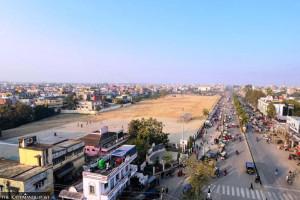Madhesh Province
Elephant menace unabated in Saptari district
The locals of Rupani Rural Municipality in Saptari were in abject terror when a herd of three wild tuskers entered the settlement on Friday evening.
Abdhesh Kumar Jha
The locals of Rupani Rural Municipality in Saptari were in abject terror when a herd of three wild tuskers entered the settlement on Friday evening. In their bid to chase away the marauding elephants, the locals made a fire and made noise but to no avail. Only when the police reached the settlement and fired four shots in the air did the elephants move to a nearby forest.
“We tried to drive away the tuskers throughout the night, but were unsuccessful. We had to fire in the air to chase away the animals,” said SP Manoj Kumar Yadav.
Elephant menace is a recurring problem in the northern part of Saptari district. The animals enter the settlements along the East-West Highway at night and wreak havoc, locals say.
On Sunday night, a herd of wild elephants destroyed 10 houses in Shambhunath Municipality, Saptari. The animals destroyed food grains stored in the houses and damaged crops planted in fields, said police.
Hareram Yadav, chief of the local unit, has demanded that the government should find a permanent solution to the problem.
“We have repeatedly asked the local administration to control the elephants, but the authorities concerned have not paid any heed to the requests. The locals have to lose their lives and properties every year in elephant attacks,” said Hareram.
Along with Rupani, many other local bodies in the district have been greatly affected by the tusker menace. The animal dismantled 34 houses and destroyed crops planted in hectares of land within the past three months in various places of Saptari district.
The local people expressed their ire towards the governments, both provincial and federal, for not taking the problem seriously.
“The problem cannot be solved at the local level due to a lack of necessary resources,” said Hareram, adding that he has also requested the provincial ministers and chief minister to control wild elephants in the district.
“Elephants cannot be shot as per the existing legal provisions of the country. All we can do is relocate them. The district administration office has already informed the concerned authorities of the problem, and has urged them to take initiative to resolve the issue,” said Chief District Officer Surendra Poudel.
As many as 75 people have been killed in elephant attacks in eight districts of Province 2 in the past 15 years. Seventeen people have lost their lives in Saptari alone.
Assistant Conservation Officer Ashok Ram, who is also a PhD scholar on elephants, said there are around 234 wild elephants across the nation that frequently enter the settlements and wreak havoc. According to him, 43 wild elephants are in Parsa, six in Saptari and two in Bara.
“The wild elephants enter into Nepal from West Bengal and Assam in India through Jhapa district. These animals reach Parsa district through the Koshi Tappu Wildlife Reserve that is spread in Sunsari, Saptari and Udayapur districts,” Ram said.
Conservationists are of the opinion that the cases of human-elephant conflict are increasing mainly due to the encroachment of the animal’s habitat. According to Ram, an adult elephant needs about 150kg food and as many litres of water every day. They enter the settlements when they cannot find food and water in the forest, he said.




 10.4°C Kathmandu
10.4°C Kathmandu















